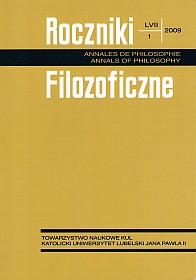Projekt filozofii witalnej w ujęciu José Ortegi y Gasseta
Abstrakt
The aim of the present article is to present José Ortega y Gasset’s philosophical thought, with special attention paid to his author’s project of vital philosophy. The author primarily focuses on the category of life that Gasset worked out, that is a reality with a radical and absolute character, both in the epistemological meaning enquiring about the foundation of our cognition, and in the metaphysical one, turning to the issue of being. Gasset is convinced about the necessity of overcoming the paradigm of modern philosophy that is based on hegemony of pure, mathematical reason, which, being unable to immobilize life and subject it to analysis, consequently turns away from it, assuming the thesis that the knowledge of what is dynamic and variable (doxa) is less valuable that the knowledge of what is stable and eternal (episteme) as a rule. Gasset’s aim, on the other hand, is the to bring back life and vitality to their proper place.
Bibliografia
Abad Pascual J.J.: El método de la razón vital y su teoría en Ortega y Gasset, Madrid 1992.
Abellán J. L.: Ortega y Gasset en la filosofía española, Madrid 1966.
Azorín: La generación del 98, Salamanca 1961.
Benavides Lucas M.: De la ameba al monstruo propicio. Raiíces naturalistas del pensamiento de Ortega y Gasset, Madrid 1988.
Blanco Amor J.: La generación del 98, Buenos Aires 1966.
Brogowski L.: Świadomość i historia. Studium o filozofii Wilhelma Diltheya, Gdańsk 2004.
Cerezo Galan P.: La voluntad de aventura. Aproximamiento crítico al pensamieno de Ortega y Gasset, Barcelona 1984.
Chamizo Domínguez P. J.:José Ortega y Gasset y la cultura española, Madrid 1985.
Cichowicz S.: O refleksję konkretną. Cztery przykłady historyczne, Gdańsk 2002.
Ferrater Mora J.: Ortega y Gasset. Etapas de una filosofía, Barcelona 1973.
Gaj R.: Orega y Gasset, („Myśli i Ludzie”), Warszawa 2007.
Górski E.: José Ortega y Gasset i kryzys ideologii hiszpańskiej, Wrocław 1982.
Gullón R.: Direcciones del modernismo, Madrid 1963.
Jagłowski M.: Życie i rozum. Filozofia racjowitalizmu Juliána Maríasa, Olsztyn 1998.
Marías J.: Ortega. Circunstancia y vocación, Madrid 1960.
Marías J.: Ortega. Las trayectorias, Madrid 1983.
Marías J.: Ortega y tres antipodas, Buenos Aires 1950.
Morron Arroyo C.: El sistema de Ortega y Gasset, Madrid 1968.
Ortega y Gasset J.: Obras Completas, t. 1-12, Madrid: Revista Occidente 1946-1983.
Ortega y Gasset J.: Obras Completas, t. 1-8, Madrid 2004-2008.
Orringer N.: Nuevas fuentes germánicas de Qué es filosofía?, Madrid 1984
Orringer N.: Ortega y sus fuentes germánicas, Madrid 1979.
Paczkowska-Łagowska E.: Logos życia. Filozofia hermeneutyczna w kręgu Wilhelma Diltheya, Gdańsk 2002.
Peña M.: Pintura de paisaje e ideología: la generación del 98, Madrid 1983.
Polit K.: Kryzys cywilizacji Zachodu w myśli José Ortegi y Gasseta, Lublin 2005.
Ramirez S.: La filosofía de Ortega y Gasset, Barcelona 1985.
Regalado García A.: El laberinto de la razón. Ortega y Heidegger, Madrid 1990.
Sanchez Villaseñor J.: Pensamiento y trayectoria de José Ortega y Gasset, Mexico 1943.
Copyright (c) 2009 Roczniki Filozoficzne

Utwór dostępny jest na licencji Creative Commons Uznanie autorstwa – Użycie niekomercyjne – Bez utworów zależnych 4.0 Międzynarodowe.





